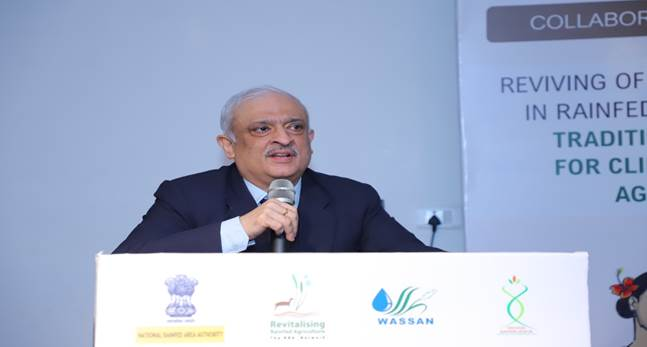Promoting Agro-Biodiversity in Rainfed Areas: Experts Advocate for Traditional Varieties to Foster Climate-Resilient Agriculture
Union Secretary of Agriculture & Farmers’ Welfare, Dr Devesh Chaturvedi, underscored the Ministry's commitment to fostering the cultivation and commercialization of traditional agricultural and horticultural varieties.

- Country:
- India
The Ministry of Agriculture & Farmers’ Welfare, along with the National Rainfed Areas Authority (NRAA), convened a multi-stakeholder convention titled "Reviving Agro-Biodiversity in Rainfed Areas through Traditional Varieties for Climate-Resilient Agriculture" in New Delhi. The event emphasized the importance of promoting traditional crop varieties to address the challenges posed by climate change and sustain rainfed agricultural systems, which account for 61% of Indian farmers and cover 50% of the country's agricultural land.
Union Secretary of Agriculture & Farmers’ Welfare, Dr Devesh Chaturvedi, underscored the Ministry's commitment to fostering the cultivation and commercialization of traditional agricultural and horticultural varieties. He outlined ongoing initiatives such as the National Mission on Natural Farming (NMNF), Farmers' Producer Organizations (FPOs), seed development programs, and the National Food Security Mission (NFSM), which are pivotal in this endeavour.
Dr. Chaturvedi highlighted the distinct advantages of traditional crop varieties, including superior taste, aroma, nutritional richness, and resilience to adverse conditions. He suggested cultivating these crops in clusters to enhance their market appeal and secure better prices for farmers.
NRAA Advocates Increased Investment in Rainfed Areas
Dr. Faiz Ahmed Kidwai, CEO of the NRAA, addressed the need for heightened investments in rainfed areas to bridge the gap between existing funding and the substantial requirements of these vulnerable regions. He reaffirmed NRAA's role in analyzing state investments and guiding policy to ensure rainfed agriculture receives adequate attention and resources.
Experts Emphasize Conservation and Utilization of Traditional Varieties
Key speakers, including Dr. K.S. Varaprasad, Former Director of ICAR-IIOR, and Gyanendra Singh, Director of ICAR-NBPGR, discussed the urgent need for in-situ conservation of traditional varieties. They highlighted the coexistence of traditional and released varieties as a sustainable model for farmers. Dr. Varaprasad noted that nearly 60% of farmers' seed requirements in rainfed areas are met through informal seed systems, such as farmer-to-farmer exchanges and community-managed seed banks.
Both experts called for stronger government support and policy interventions to formalize community-managed seed systems and preserve agro-biodiversity.
Farmers and Grassroots Efforts Spotlighted
Champion farmers and seed saviors from 10 states, including Tamil Nadu and Odisha, showcased indigenous seed varieties and shared experiences in conserving and cultivating traditional crops. The discussions highlighted successes in linking traditional varieties to markets, leveraging natural farming schemes, and integrating these varieties into state policies, as seen in Tamil Nadu, West Bengal, and Odisha.
Developing an Action Plan for Policy and Market Linkages
The convention concluded with a call to develop an actionable framework to support traditional variety conservation. Recommendations will be submitted to the Ministry of Agriculture & Farmers’ Welfare, focusing on integrating traditional varieties into mainstream agriculture through infrastructure development, Minimum Support Price (MSP) mechanisms, and policy alignment.
The NRAA pledged to sustain its consultative approach in collaboration with organizations such as the Revitalizing Rainfed Agriculture Network (RRAN) and Watershed Support Services & Activities Network (WASSAN).
This initiative aligns with the strategies adopted by the Government of India for the promotion of millets, leveraging lessons learned to strengthen traditional variety cultivation and address the challenges of climate-resilient agriculture.
The convention served as a reminder of the pivotal role traditional crops play in ensuring food security, preserving biodiversity, and supporting the livelihoods of millions of rainfed farmers across India.










